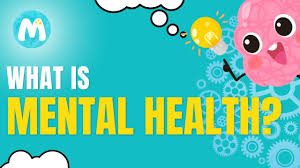In this article, we discussed the meaning of mental health in children, the factors, how to promote good mental health, types, causes and prevention
Definition
A child’s mental health is their emotional, behavioral, social, and cognitive well-being. It’s important for children to have good mental health because it can affect how they feel about themselves, how they relate to others, and how they cope with life.
Factors that affect a child’s mental health
Family: Unconditional love, a safe and secure environment, and appropriate guidance
Community: Encouraging teachers and supportive caretakers
Genetics: Some genes are associated with psychiatric disorders
Developmental milestones: Children experience unique developmental milestones that affect their mental health
Parental mental health: Is a problems that can increase the risk of children developing behavioral, social, emotional, and educational problems
Anxiety disorders, such as generalized anxiety disorder or separation anxiety disorder
Other psychiatric disorders that can cause distress and functional impairment
Signs of mental health problems Difficulties in psychological and emotional development, social relationship problems, and Behavioral problems.
How to promote good mental health
Help children learn productive ways to manage stress
Help children learn how to express themselves and their emotions
Encourage children to take on challenges with confidence
Encourage children to talk back to their negative thoughts
Types of Mental Health in Children
Children can experience a variety of mental health issues, including anxiety disorders, mood disorders, behavioral disorders, and more.
Anxiety disorders
Separation anxiety: A type of anxiety disorder that can affect children
Generalized anxiety disorder: A type of anxiety disorder that can affect children
Mood disorders
Depression: A mood disorder that can affect children
Bipolar affective disorder: A mood disorder that can affect children
Behavioral disorders
Oppositional defiant disorder (ODD): A behavioral disorder that involves persistent defiance towards authority figures
Conduct disorder: A behavioral disorder that involves disruptive behavior
Attention-deficit/hyperactivity disorder (ADHD): A behavioral disorder that involves attention and hyperactivity issues
Other mental health issues
Obsessive-compulsive disorder (OCD): A mental health issue that involves unwanted thoughts and behaviors
Post-traumatic stress disorder (PTSD): A mental health issue that can develop after a traumatic event
Autism spectrum disorder: this issue that can affect children
Early treatment can help children manage their symptoms and support their development.
Causes of Mental Health in Children
childhood abuse, trauma, or neglect.
social isolation or loneliness.
experiencing discrimination and stigma, including racism.
social disadvantage, poverty or debt.
bereavement (losing someone close to you)
severe or long-term stress.
having a long-term physical health condition.
How to Prevent Mental Health in Children
Preventing mental health issues in children involves creating a safe and supportive environment, encouraging healthy behaviors, and identifying and addressing concerns early.
Create a safe and supportive environment
Make home a safe space: A home that feels safe and allows children to express their emotions can help them feel confident.
Communicate openly: Listen to your child with curiosity and understanding, and encourage them to keep talking.
Reinforce positive behaviors: Praise your child and let them know what you love about them.
Encourage healthy behaviors
Eat well: A balanced diet that includes fruits, vegetables, whole grains, lean protein, nuts, and seeds can help.
Exercise regularly: Physical activity can improve mood, help children fall asleep, and reduce time spent on screens.
Get enough sleep: Getting enough sleep for your child’s age can help.
Build relationships: Spending time with family, friends, and the community can help.
Identify and address concerns early
Be a first responder
Parents, pediatricians, child care providers, and home visitors can help identify and address concerns.
Catch problems early
Intervening before problems become more serious can help children succeed and lead healthy lives.
Conclusion
A child’s mental health is their emotional, behavioral, social, and cognitive well-being. It’s important for children to have good mental health because it can affect how they feel about themselves, how they relate to others, and how they cope with life.


